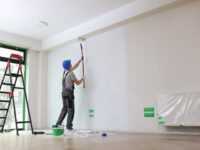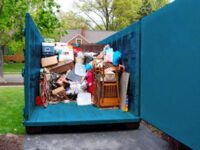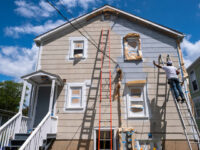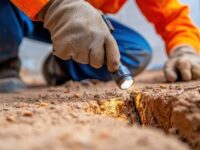Understanding the Daily Tasks of a Professional Plumber
Plumbers are responsible for installing, repairing, and maintaining the water and sewage infrastructure that keeps modern society running smoothly. This career often requires working in residential and commercial settings, interpreting blueprints, and collaborating with construction teams to ensure plumbing systems are integrated seamlessly into building projects.
Plumbers perform visual inspections of accessible plumbing pipes, fixtures, and water heaters to identify problems like leaking joints, insufficient water flow, or blocked drains. These inspections can also detect issues with underlying drainage and venting systems. Contact Plumber Sarasota for professional help.
Plumbing contractors install the piping that distributes water throughout a home or building. This work includes laying out the pipework for kitchens, bathrooms, and laundry rooms during new construction and repairing existing systems in older homes and buildings. Plumbers must be skilled at reading blueprints and following state and local plumbing codes. They also use a variety of tools and equipment, such as power threading machines, soldering irons, welding equipment, and propane torches.
During the rough-in phase of a plumbing installation, the plumber locates all supply and waste connections from the building system to public utilities. The plumber then cuts holes in the floor, ceiling, and walls to hang and attach pipes for connecting to fixtures. During this process, the plumber may also measure the square footage for new sinks, toilets, and appliances like dishwashers to ensure they fit properly. The plumber then tests the piping for leaks, proper water pressure, and adequate drainage.
Another important part of the rough-in stage is inspecting and testing all plumbing components before closing up the walls. The plumber checks all visible water supply lines for leaks, breaks, corrosion, and signs of rusting or contamination. They also test the draining system by running cameras down all pipes to check for clogs, flow rates, and proper operation. Finally, the plumber inspects the water heater for proper installation, venting, energy efficiency, and safety valves.
While this is a general outline of a plumber’s duties, each job will vary depending on the requirements of the project. Some plumbers specialize in residential plumbing while others may focus on commercial or industrial settings. Some even specialize in specific types of plumbing installations, such as gas lines or water heaters. Regardless of their focus, all plumbers must have excellent communication skills in order to understand the needs of their clients and collaborate effectively with other team members. They must also have strong problem-solving abilities to quickly identify and resolve issues. These skills are essential for success in the field of plumbing and will help to ensure that each customer receives the highest quality of service.
Repair
Plumbing systems are subject to wear and tear just like any other part of a house. This means they need regular maintenance to ensure they function properly. A plumber can identify problems, repair or replace parts and restore the plumbing system to its original condition.
Leaking pipes are one of the most common issues homeowners call a plumber for. These leaks can cause water damage, mold and mildew. If left unattended, they can also lead to costly repairs and replacements. Plumbers check all visible water supply lines for signs of leaks, corrosion, breaks or kinks. They will also test water pressure to ensure it falls within the recommended range.
Another common problem plumbers repair is clogged drains and toilets. Clogged fixtures can result in low water flow, slow drainage and even sewer backups. Plumbers use a variety of tools to clear clogged pipes and restore proper flow.
Plumbers also inspect and repair drain and vent systems. These pipes carry wastewater away from fixtures and out of the home. They will examine all drain traps, p-traps and vents for leaks, detachments or blockages. They will also check for proper slope and ventilation to avoid clogs, poor drainage and sewer gas odors.
A plumber can also repair or replace fixtures such as sinks, faucets, showerheads, toilets and dishwashers. They can also install or replace appliances such as garbage disposals and water heaters. When replacing a fixture, plumbers will consider its energy efficiency and water conservation features as well as the location and accessibility of the existing plumbing. Leaking or damaged fixtures should be repaired immediately to prevent more extensive and costly damage. For example, a leaking faucet can cause water stains on the ceiling or wall, while a leaking toilet may create water and mold damage to the floor and walls. In some cases, a faulty water heater can cause fires or explosions. Plumbers will assess the situation and recommend the best course of action.
Maintenance
Plumbing systems are complex and largely hidden from view, but they’re essential to our everyday lives. Our homes’ plumbing provides us with clean water, removes waste, and maintains temperature control. It’s important to have your plumbing system regularly inspected and maintained by a professional plumber to keep it functioning properly.
A high school diploma or alternative accreditation is the minimum educational requirement to become a plumber, but completing an apprenticeship program can provide a strong foundation for a successful career in this skilled trade. These programs typically last two to five years and include classroom instruction and hands-on experience working alongside an experienced plumber.
Both residential and commercial plumbers install, repair, and maintain plumbing systems in a variety of settings. Residential plumbers typically work on systems that serve single family households. Their responsibilities may include laying out the pipework for kitchens and bathrooms during construction, as well as repairing existing plumbing systems in homes and apartments. Commercial plumbers work on larger systems in a variety of business and industrial settings, such as office buildings, shopping malls, hospitals, and power plants. These plumbers often work with larger, more complex equipment and may need to collaborate with other professionals to ensure plumbing systems integrate seamlessly into building projects.
Regular maintenance of a plumbing system is key to avoiding costly repairs down the road. Plumbing inspections can help identify and address issues like leaks, clogs, and signs of rust or corrosion. Plumbers can also test your water pressure to make sure it’s adequate for your household needs.
As with any type of skilled trade, plumbers must continually hone their skills to stay ahead of the curve when it comes to new technology, techniques, and tools. They must also remain up-to-date on current building codes and regulations to ensure their work meets industry standards and protects occupants’ health and safety. In addition to on-the-job training, many plumbers pursue ongoing education to expand their knowledge and keep up with evolving technologies. This ensures they’re prepared for challenging jobs, enables them to offer more comprehensive services, and helps customers understand complicated plumbing issues.
Troubleshooting
When a leaky pipe is left unchecked, it can lead to serious water damage in your home. Not only does it ruin furniture and carpets, but it also promotes the growth of toxic mold and mildew. If you suspect a leak, it is important to call in a plumber as soon as possible.
Leaky pipes are usually caused by worn-out or corroded fittings, poor installation, or damage from external factors. To fix the problem, a plumber will replace the damaged fittings or pipes and make any necessary repairs. A plumbing professional will have the proper tools and equipment to do the job quickly and efficiently.
A plumber will inspect all visible plumbing components to ensure they are safe and working properly. They will check for things like clogged drains, leaky faucets, broken water heater tanks, and more. In addition, they will verify the materials used for the plumbing are up to code standards.
Another crucial aspect of a plumber’s inspection is testing the water pressure. They will attach a gauge to an exterior hose bib and ensure the water pressure falls within the recommended range. This will help to prevent overworked or undersized pipes, which can cause water leaks and other problems.
The plumber will also examine all drain and vent lines throughout the house to make sure they are clear of obstructions and working properly. These include waste drain lines, which carry wastewater away from fixtures, and venting lines, which allow air to flow into and out of the plumbing system. Plumbers will look for signs of clogs, improper slope, or damage to these lines, which can cause problems like low drainage, sewer gas odors, and flooding.
If you notice a sudden drop in water pressure, it is likely due to a clog or leak in your plumbing system. Clogged drains are common problems that can be caused by hair, soap scum, toilet paper, feminine products, and other items that shouldn’t be in the pipes. If these issues aren’t addressed, they may lead to water damage, high utility bills, and other costly repairs.






